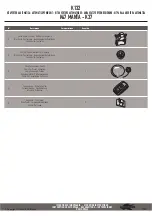
2
The ART-5450 is a fanless, compact and rugged embedded system
designed specifically for in-vehicle fleet management applications.
Its inclusion of various mobile and wireless protocols serves to
provide the necessary connectivity for maintaining proper
communications with a dispatch center.
The ART-5450 system is based on the Em-ITX mainboard form
factor stacked with the EMIO-3450 module and powered by a VIA
Nano E 1.0 GHz processor. The ART-5450 supports high
computing power operation with low power consumption. And it
is capable of handling a wide range DC power inputs from 7V to
36V in both AT and ATX modes.
The ART-5450 also uses a special design to handle the critical issue
of in-vehicle power management (ignition on/off, delay on/off,
schedule the maintenance power on / off time). The power
management system protects the ART-5450 from power surges —
guarding against damage from transient car power. With the
power management system it is capable of handling a wide range
DC power inputs from 10V to 30V.
The ART-5450 system supports dual-sided multiple I/O connectors
such as audio ports, USB 2.0 ports, configurable COM ports, VGA
port, LVDS ports, Gigabit Ethernet ports, CompactFlash slot, and
SIM card slot.
The ART-5450 system offers an expansive array of connectivity
options including a 20 channel GPS receiver and Wireless LAN. In
addition, it supports a variety of common mobile network
protocols such as 3.5G, 2G, WCDMA, EDGE, and GPRS.
The ART-5450’s system chassis is a robust aluminum alloy and
designed to support mounting to a floor bed or side-panel of a
vehicle.
These combined features make the ART-5450 ideally suited for
wireless, in-vehicle system and fleet management applications.
Summary of Contents for ART-5450
Page 12: ...XII ...
Page 13: ...1 1 Product Overview ...
Page 21: ...9 ART 5450 DIMENSIONS ...
Page 49: ...37 Step 2 Fasten the mounting brackets to the bottom side of the ART 5450 chassis as shown ...
Page 50: ...38 Step 3 Secure both mounting brackets to the wall table with four screws ...
Page 52: ...40 Step 4 Connect the power module to the power source using the provided cable ...
Page 54: ...42 Power Input Connector Pin Signal 1 IGN2 2 GND 3 DC 10 30V 4 ACC 5 GND 6 DC 10 30V 1 3 4 6 ...
Page 61: ...49 5 BIOS Setup This chapter gives a detailed explanation of the BIOS setup functions ...
Page 71: ...59 Summary Screen Show Show summary screen Settings Disabled Enabled ...
Page 100: ......
Page 101: ...89 6 Driver Installation ...















































